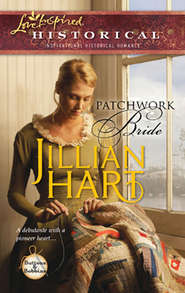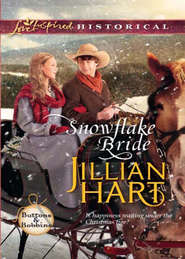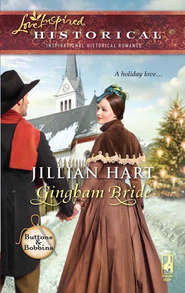По всем вопросам обращайтесь на: info@litportal.ru
(©) 2003-2024.
✖
High Country Bride
Настройки чтения
Размер шрифта
Высота строк
Поля
“Oh.”
Aiden steeled himself to the sound of the small boy’s disappointment, too. He told himself the shanty was snug and would do just fine for them all, but the truth was, he couldn’t stomach the notion of having another woman in the house he’d built for Kate.
He followed the fork in the road that skirted the barn and led south from the main house to the small dark structure of wood and plaster. He heard the children’s quiet questions to their mother and tried not to hear the soothing lull of her answers as he dismounted.
Opening the door and finding the nearest lantern kept his mind off the ragged family climbing down from their wagon in the front yard. By the time he’d lit the second lantern, the boy stood in the open doorway, looking smaller for the darkness and shadows cast over him.
The child’s serious eyes were unblinking as he watched Aiden cross the one-room house to the cook-stove in the corner. If his guess was right about Mrs. Nelson, she would want tea with supper and wash water for cleaning up. He knelt down and began to build a fire with the bucket of kindling and sticks of wood left over from when his middle brother had been living here.
The boy said nothing, just watched with wide eyes. Aiden tried not to think much about the child. Not out of heartlessness—no, never that.
By the time he got the fire lit and flames licked greedily at the tinder-dry wood, the woman arrived at the door with her littlest on her hip. Without a word she glanced around the shanty. Her face was gaunt in the half darkness, her feelings masked. He couldn’t tell if she was disappointed in the shelter or relieved.
After closing the stove door, he rose to his feet. “I’ll bring in some water for you, ma’am. I’ll send my brother out with supper.”
“No. Thank you, but no.” She looked stricken. “I’ve already been so much trouble to you. I can’t be—I won’t be—more beholden to you. I—”
“You shoulda thought of that when you decided to live on a piece of my property.” He watched her rear back—just a step, just a small movement, but somehow it felt like a larger motion. As if he’d truly insulted her. It was not what he’d meant.
Tread softly, man. He checked his voice, gentling it as much as he was able. “Just put aside your worries for tonight. I’ll sleep easier knowing you and your young ones are safe instead of sleeping out there alone on the prairie. Do you understand?”
“Fine. Then we’ll speak again tomorrow. I am grateful.” Tension still tightened her face, and the flickering light seemed to emphasize the hollows and lines there, in those lovely features that ought to be soft with happiness and contentment.
It was not a fair world, and he knew it as much as anyone. He jammed the match tin onto the shelf with a little too much force. Watching the way Mrs. Nelson’s gaze moved with relief and pleasure around the shanty shamed him. The place wasn’t much. He wasn’t sure what his Christian duty was, but he hoped he was doing his share. He touched his hat brim. “’Scuse me, ma’am, I’ll say good night, then.”
“Thank you for your kindness.” She moved from the doorway with a rustle of petticoats and a hush of skirts, careful to keep her distance from him. “Good night, Mr. McKaslin.”
When he crossed the threshold, he could feel her sigh of relief. He made her uneasy, and it troubled him as he hiked through the growing grasses, for he was uneasy, too. He’d never thought there would be another woman on his land—even for just the night and even in the shanty.
He kept going until the shanty was nothing more than a faint black outline against the shadowed sky. Kindness, Mrs. Nelson had called it, but it was nothing of the sort. He was only doing the right thing, and that did not come without cost.
“Ma, that was a mighty fine supper!” James’s grin was so wide it was likely to split his face. “I cleaned my whole plate.”
“Yes, you did.” Joanna lifted the kettle of water steaming on the back of the stove. “You be sure and thank Mr. McKaslin the next time you see him.”
“Yes’m. I’m puttin’ him in my prayers tonight. I was gettin’ mighty tired of creek fish.” The little boy slid his plate and steel fork next to the washbasin on the table. “Are you sure we can’t stay here forever?”
“Yes, I’m sure. This is only for tonight.” Holding her heart still, Joanna carefully poured the steaming water into the basin and returned the half-full kettle to the stove. Mr. McKaslin. Now, there was a puzzle. She could not figure that man out. In the field, when she’d come up with water from the creek, she’d been afraid of him. He’d been so angry. Now she realized it wasn’t anger at all. No, not if he’d brought them here.
She reached for the bar of lye soap she’d brought in from the wagon earlier, and began to pare off shavings, which fell into the hot water to curl and melt. She felt a little like those shavings, wilting a bit. She wasn’t used to taking charity, but as she watched her children move about contentedly, she was grateful to Mr. McKaslin. Somehow she would find a way to repay him for his kindness.
Daisy sidled close with her plate and yawned hugely.
“Is it time for bed already?” Joanna glanced at the shelf clock, which sat mute, the motionless hands frozen at ten minutes after one, clearly the wrong time. “Go on, you two, wash up and get changed.”
“Ma.” Daisy tugged on a fold of Joanna’s skirt, looking up with big blue eyes full of worry. “What about the angels?”
Joanna’s heart twisted hard. The first night they’d slept in the wagon, she had told them that the wagon cover was better than a roof because it made it easier for the angels to watch over them. “The angels will be able to keep an eye on you just fine, baby. Now, you wash up and we’ll read more from our book. How’s that?”
Daisy’s smile showed the perfect dimples in her cheeks.
“That’d be mighty fine!” James, listening in, looked as if he could not believe his luck.
As they scampered to finish their washing up, Joanna left the dishes to soak in the water and plucked a sheet from the small box she’d brought in earlier. There, in the small mirror above the washbasin, her face was staring back at her.
That’s me? She froze, gazing at the strange woman in the mirror. She’d never been pretty, and she knew it. Her husband had always taken pains to point out her plainness. But she could never remember looking this poorly. Her hair—her only vanity—was dry and flyaway instead of glossy and sleek. Her face was ashen and the hollows beneath her eyes were as dark as day-old bruises. Her cheeks were gaunt and her eyes too big. Sadness had dug lines that had not been there before.
That was not her, she thought, ashamed. That was not the face of a twenty-eight-year-old woman. No wonder Aiden McKaslin had barely glanced at her, and, when he did, it was with that shuttered look of annoyance. What must he see? What must he think of her? And why was she remembering how kind and strong he’d seemed, too? And how changed he’d been around the children?
It didn’t matter. After tomorrow she would never see him again.
Tomorrow. That was one thought she wanted to avoid. As hard as she tried not to admit it, she and her children were now covered-wagon people—the homeless people of the West—and she could no longer deny it.
Should they stay in the area? Find another forgotten piece of prairie to park their wagon on? It was too early for harvest work in the fields. And where would she leave her children while she was working?
Should they leave Angel Falls? The horses were in no condition, as old as they were, to pull the wagon a long distance. She did not have the money to stay—particularly come morning, after she squared up what she owed to Aiden McKaslin.
“Ma!” Daisy’s sweet voice broke into her thoughts. “I can’t reach.”
She blinked, realizing her daughter was waiting for her to unbutton her little dress. Joanna banished her worries with a shake of her head—there would be enough time to dwell on them later, when she was unable to fall to sleep—and tackled the tiny buttons marching down the back of Daisy’s pink calico dress. “There, now. Go get your nightgown and I’ll have your bed nice and ready.”
“Yes, Ma.” Daisy scampered off to where their satchel of clothes sat on the floor. She knelt, all sweetness, to peer inside the bag and search for her nightie.
Yes, Joanna had some decisions to make. She shook out the worn muslin over the straw tick with a snap. The fabric fluttered into place, and she bent to smooth and tuck quickly. Her troubled thoughts turned to Aiden McKaslin. Funny, her pa had lived next door to the McKaslins for the last five years, and he’d never said much about Aiden except that he was highly disagreeable. Then again, Pa had been highly disagreeable himself.
Joanna had seen Mr. McKaslin in church since she’d come to stay with her father, but didn’t know anything about him at all. Certainly not what he’d said. His words came back to her. I buried a wife and son years ago, what was most precious to me, and to see you and them neglected like this—with no one to care—
Not only was she sad for this man who had lost so much, but she admired him, too. He was a good man—rare, in her opinion—or at least good enough to care about someone not his concern. There were men who would have thrown her off the land without blinking. Some would have threatened her with the sheriff.
But Aiden McKaslin had brought her here. She looked around the structure, so solidly built, and clean, except for a little dust here and there. There was a stout roof overhead and not a single crack in a wall. Real glass windows stared out at the gathering darkness and showed a round moon hanging low over the valley. Yes, she would remember Aiden McKaslin in her prayers tonight.
By the time she’d added a top sheet to the straw tick and the quilts from the wagon, the children had said their prayers and were ready for bed. She tucked them in, kissed their brows and told them what a good job they’d done today. When she turned out the lantern by the bedside, after reading to them as she’d promised, she left them sound asleep. She finished the dishes in the meager light of a single lantern, listening to the sounds of the night. Thinking of her problems and her limited choices to solve them overwhelmed her.
When the dishes were done and put away into the crate, she sat down with her mending. She worked while the fire burned down and moonlight moved across the floor of the shanty. Midnight came and she was still sitting with a needle in her hand, wondering what the morning would bring.
She hoped she would be strong enough to face it.
Aiden looked up from his newspaper when he heard Finn’s boot steps pounding into the kitchen. Sure enough, there was his little brother—twenty years old—worked up into a fever. No surprise there. Aiden took a sip of his tea, assessing the boy’s mood over the rim of his cup. Finn could surprise you, but it was best to try to at least figure out his state before attempting to deal with him. As much as Aiden loved his youngest brother, he had to be honest about his flaws and weaknesses—there were many of those. Judging by the disgruntled frown, the crease of annoyance in Finn’s forehead and the angry way he tossed the harness strap across the back of one of the chairs, Aiden figured his brother was working himself up into a temper.
Best not to react to it or encourage it. “I see you had trouble fixing that harness. Why don’t you get a cup of tea? We’ll tackle it tomorrow.”
“Trouble? I didn’t have any trouble.” Finn took off his battered work hat and plucked his newer, going-to-town hat from the wall peg. “What I have is a problem sewing that up for her.”
“It’s what I asked you to do. Technically, you would be doing it for me.”
Finn cursed. “Do you think having a woman live out there is a good idea?”
“No, but what else would you have me do with her?”











